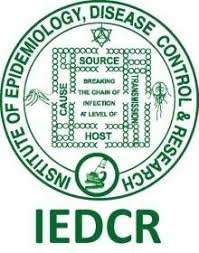Institute of Epidemiology, Disease Control and Research
Institute of Epidemiology, Disease Control and Research (IEDCR) is a national research institute in Bangladesh that specializes in epidemiology and public health research, disease control, and health policy development. It plays a pivotal role in the surveillance, outbreak investigation, and control of various infectious and non-infectious diseases in Bangladesh. The IEDCR is also involved in conducting epidemiological research, training health professionals, and advising the government on public health issues and policies.
History[edit | edit source]
The IEDCR was established to address the growing needs for research, disease control, and epidemiological surveillance in Bangladesh. It has evolved over the years to become the leading institution in the country for disease control and public health research. The institute has been at the forefront of managing and responding to public health emergencies, including outbreaks of dengue fever, avian influenza, and more recently, the COVID-19 pandemic.
Functions and Objectives[edit | edit source]
The primary functions and objectives of the IEDCR include:
- Conducting surveillance of infectious and non-infectious diseases.
- Investigating and controlling disease outbreaks.
- Conducting epidemiological and public health research.
- Developing and advising on health policies and strategies.
- Training health professionals in epidemiology and disease control.
Research and Surveillance[edit | edit source]
The IEDCR conducts regular surveillance on a wide range of diseases to monitor their trends and identify outbreaks. This surveillance data is crucial for the early detection of outbreaks and the formulation of effective control strategies. The institute also undertakes research projects aimed at understanding the epidemiology of specific diseases, evaluating health interventions, and improving disease prevention and control measures.
Outbreak Response[edit | edit source]
The IEDCR has a dedicated team for outbreak investigation and response. This team is equipped to rapidly respond to outbreaks of infectious diseases, conduct field investigations, and implement control measures to prevent the spread of diseases. The institute works closely with local and international partners, including the World Health Organization (WHO), to enhance its outbreak response capabilities.
Training and Capacity Building[edit | edit source]
One of the key roles of the IEDCR is to build the capacity of health professionals in Bangladesh. The institute offers training programs in epidemiology, disease surveillance, outbreak investigation, and public health research methods. These programs are designed to strengthen the public health workforce and improve the country's capacity to manage and control diseases.
Challenges and Future Directions[edit | edit source]
Despite its achievements, the IEDCR faces several challenges, including limited resources, the need for modernization of its surveillance systems, and the increasing burden of non-communicable diseases. The institute is working towards addressing these challenges by enhancing its research capabilities, expanding its surveillance network, and fostering partnerships with national and international organizations.
The future directions of the IEDCR include focusing on emerging and re-emerging infectious diseases, strengthening health systems research, and contributing to the development of evidence-based health policies and practices. The institute aims to continue its role as a leader in public health research and disease control in Bangladesh and the region.
Search WikiMD
Ad.Tired of being Overweight? Try W8MD's physician weight loss program.
Semaglutide (Ozempic / Wegovy and Tirzepatide (Mounjaro / Zepbound) available.
Advertise on WikiMD
|
WikiMD's Wellness Encyclopedia |
| Let Food Be Thy Medicine Medicine Thy Food - Hippocrates |
Translate this page: - East Asian
中文,
日本,
한국어,
South Asian
हिन्दी,
தமிழ்,
తెలుగు,
Urdu,
ಕನ್ನಡ,
Southeast Asian
Indonesian,
Vietnamese,
Thai,
မြန်မာဘာသာ,
বাংলা
European
español,
Deutsch,
français,
Greek,
português do Brasil,
polski,
română,
русский,
Nederlands,
norsk,
svenska,
suomi,
Italian
Middle Eastern & African
عربى,
Turkish,
Persian,
Hebrew,
Afrikaans,
isiZulu,
Kiswahili,
Other
Bulgarian,
Hungarian,
Czech,
Swedish,
മലയാളം,
मराठी,
ਪੰਜਾਬੀ,
ગુજરાતી,
Portuguese,
Ukrainian
Medical Disclaimer: WikiMD is not a substitute for professional medical advice. The information on WikiMD is provided as an information resource only, may be incorrect, outdated or misleading, and is not to be used or relied on for any diagnostic or treatment purposes. Please consult your health care provider before making any healthcare decisions or for guidance about a specific medical condition. WikiMD expressly disclaims responsibility, and shall have no liability, for any damages, loss, injury, or liability whatsoever suffered as a result of your reliance on the information contained in this site. By visiting this site you agree to the foregoing terms and conditions, which may from time to time be changed or supplemented by WikiMD. If you do not agree to the foregoing terms and conditions, you should not enter or use this site. See full disclaimer.
Credits:Most images are courtesy of Wikimedia commons, and templates Wikipedia, licensed under CC BY SA or similar.
Contributors: Prab R. Tumpati, MD

